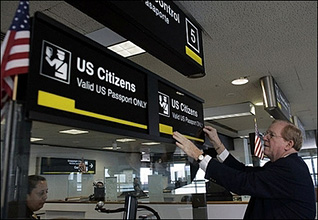 |
 |
 |
 News Around the Republic of Mexico | June 2007 News Around the Republic of Mexico | June 2007  
Mexico, US Agree to Improve Customs Services
 Reuters Reuters


| | William Kuiken, from the Miami-Dade Aviation department, changes a sign at the US Customs and Border Protection Passport control area in 2007 at Miami International Airport. The US State Department announced Friday it was temporarily easing restrictions imposed this year that require Americans to have passports to travel to Mexico, Canada, the Caribbean and Bermuda. (AFP/Joe Raedle) |
Mexico and the United States agreed on Friday to improve their customs services to reduce drug trafficking, just weeks after Mexico admitted its border crossings were a weak point in its war against drug gangs.

Mexican Finance Minister Augustin Carstens signed a preliminary agreement with Washington that would upgrade equipment and raise the "personal integrity" of customs agents.

Two weeks ago, Carstens said cleaning up the customs service and bringing in new technology were vital to fighting traffickers.

In Mexico customs officials are widely believed to take bribes to allow contraband to pass border crossings.

Mexico is struggling against powerful and violent drugs gangs who smuggle South American cocaine and locally grown marijuana and opium across the border into the United States.

The U.S. Homeland Security Department said the agreement would allow the two countries to "establish new programs to fight contraband trafficking and smuggling of prohibited goods and related crimes."

It did not give details of those programs.

According to the U.S. State Department, more than 90 percent of the South American cocaine that arrives in the United States passes through Mexico.

Cocaine mainly crosses the border in commercial trucks modified with hidden compartments or concealed with legitimate cargo, the State Department says. | 
 | |
 |



